Thursday, 20 November 2008
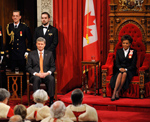 The term "Speech from the Throne" itself reminds us that the present confederation began as the mere first self-governing dominion of the British empire — back in "the era of Queen Victoria," and so forth (as the excellent Governor General Michaelle Jean put it on the afternoon of Wednesday, February 19, 2008). And the peculiar half-national anthem that the air force band played at the start and finish of Mme Jean’s leisurely inspection of the guard on Parliament Hill — beginning with the old "God Save the Queen" and ending with "O Canada" — reminded us that we have still not altogether cast ourselves off from our colonial past. On the other hand, there were no old Union Jacks flying on Parliament Hill as Mme Jean arrived. There was just the 1965 maple-leaf flag of today’s independent North American member of the United Nations. After the brief ritual bow to Queen Victoria (now dead for more than a century), the speech which Mme Jean gave on behalf of Stephen Harper’s second minority government fell all over itself with tributes to the "women and men ... who established democracy in this country," the "ideal of democracy that we embody in the world," the "people [who] spoke once again in a general election," and the "parliamentary democracy" in which "the government must always be ... accountable to the people’s representatives." None of this could match the people’s new Obamamania down south. But you felt someone was trying, at least. The term "Speech from the Throne" itself reminds us that the present confederation began as the mere first self-governing dominion of the British empire — back in "the era of Queen Victoria," and so forth (as the excellent Governor General Michaelle Jean put it on the afternoon of Wednesday, February 19, 2008). And the peculiar half-national anthem that the air force band played at the start and finish of Mme Jean’s leisurely inspection of the guard on Parliament Hill — beginning with the old "God Save the Queen" and ending with "O Canada" — reminded us that we have still not altogether cast ourselves off from our colonial past. On the other hand, there were no old Union Jacks flying on Parliament Hill as Mme Jean arrived. There was just the 1965 maple-leaf flag of today’s independent North American member of the United Nations. After the brief ritual bow to Queen Victoria (now dead for more than a century), the speech which Mme Jean gave on behalf of Stephen Harper’s second minority government fell all over itself with tributes to the "women and men ... who established democracy in this country," the "ideal of democracy that we embody in the world," the "people [who] spoke once again in a general election," and the "parliamentary democracy" in which "the government must always be ... accountable to the people’s representatives." None of this could match the people’s new Obamamania down south. But you felt someone was trying, at least.
* * * *
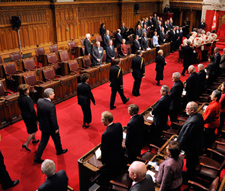 Once all the formal (and still vaguely colonial) beginnings were over, the 143rd Throne Speech that opened the 40th Parliament of the Canadian confederation which began in 1867 was even more vague and soggy than usual. The reports beforehand had said it was going to be all about the economy, in keeping with the Canadian people’s new most important priority in a time of increasing international economic stress. These reports proved more or less if not entirely correct. Once all the formal (and still vaguely colonial) beginnings were over, the 143rd Throne Speech that opened the 40th Parliament of the Canadian confederation which began in 1867 was even more vague and soggy than usual. The reports beforehand had said it was going to be all about the economy, in keeping with the Canadian people’s new most important priority in a time of increasing international economic stress. These reports proved more or less if not entirely correct.
The usual assortment of rhetorical flourishes at the start included: "We know that Canadians will face the problems of today with the same spirit of determination and resolve as those who came before us faced the challenges of their generation. And like them, we know that we will emerge stronger than ever." Then Mr Harper had Mme Jean read a pastiche of motherhood generalities, grouped under 11 headings. Between the lines an Ottawa cynic might see some more specific thoughts, that will presumably be elaborated on by the minister of finance in "the Economic and Fiscal Statement to be delivered next week."
1. Reforming Global Finance
One may of course wonder if much of the world is listening when Mr. Harper says: "Canada will use its experience in developing a strong model of financial regulation to help lead the world in the repair and strengthening of the international financial system." (And in any case in the House on the morning after Stephane Dion made a point of pointing out that such things as a "strong model of financial regulation" and so forth are largely Liberal inventions that Conservatives like Mr. Harper have bemoaned in the past.)
There seems some agreement among the Ottawa punditocracy that the one serious point here is "The credit crisis has also underlined the dangers of a fragmented financial regulatory system. To further strengthen financial oversight in Canada, our Government will work with the provinces to put in place a common securities regulator." Quebec of course will have nothing to do with all this. And apparently the thought here is that perhaps Ottawa and the other provinces will go ahead without Quebec — as in the case of pension plans and so much else. But, when push gets to shove, do Calgary and Vancouver really want a common securities regulator in Toronto, etc?
2. Ensuring Sound Budgeting
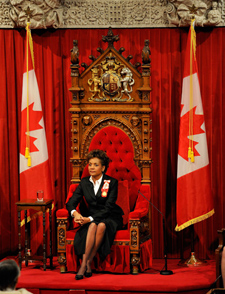 "Our Government is also committed to responsible fiscal management of public sector compensation, and will table legislation to ensure sustainable compensation growth in the federal Public Service." I.e. there certainly won’t be any raises for the federal public service. "Our Government is also committed to responsible fiscal management of public sector compensation, and will table legislation to ensure sustainable compensation growth in the federal Public Service." I.e. there certainly won’t be any raises for the federal public service.
Also: "Our Government will engage Parliament and encourage members to take a more active role in scrutinizing spending and suggesting areas for restraint." And: "We will ensure that Equalization payments also grow, but that they do not grow more quickly than our economy as a whole." (And if the economy doesn’t grow at all, presumably neither will equalization etc?)
At the same time: "in a historic global downturn, it would be misguided to commit to a balanced budget in the short term at any cost, because that cost would ultimately be borne by Canadian families." [And see item (2) in Some final odds and ends below as well.]
3. Securing Jobs for Families and Communities
This seems just a number of promises to continue doing what the Government of Canada is already doing and/or not doing for and to various Canadians. But it may be slightly significant that the "Canadian manufacturing sector, particularly the automotive and aerospace industries, has been under increasing strain. Our Government will provide further support for these industries."
4. Expanding Investment and Trade
More plans to do what has already been planned. E.g.: "Our Government will proceed with legislation to ratify the results of trade negotiations that have been concluded with the European Free Trade Association, Peru, Colombia and Jordan." (But remember that the European Free Trade Association is the small number of countries who are NOT part of the European Union! And then how much richer will free trade with Jordan make us, etc, etc?)
Also: "Our Government will work with the provinces to remove barriers to internal trade, investment and labour mobility by 2010." (But see comments on the common securities regulator under heading 1 above!)
5. Making Government More Effective
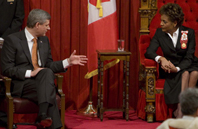 "To make Canada’s national government more effective, our Government is committed to reform and streamline the way it does business." "To make Canada’s national government more effective, our Government is committed to reform and streamline the way it does business."
To some minds this may sound like the kinds of things Mike Harris tried to in Ontario provincially, which actually made government less effective than it was before (which is after all the usual Conservative objective, to conform with the right-wing ideology than the so-called private sector always works better — except perhaps in the middle of great depressions?)
6. Securing Our Energy Future
In case anyone still has any shreds of doubt on this point, the Harper minority government with its strongest support in oil-rich Alberta remains altogether committed to the proposition that "development of our rich energy resources is an important source of wealth and Canadian jobs."
Also: "Economic development in Canada’s North, led by a new stand-alone agency, is a key element of our Northern Strategy." Perhaps "the Economic and Fiscal Statement to be delivered next week" will elucidate further?
7. Tackling Climate Change and Preserving Canada’s Environment
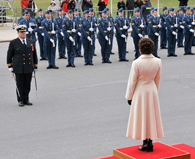 The second Harper minority government does seem determined to sound more positive about all this than it has in the past. Two particular points in the fall 2008 throne speech were somewhat striking — or at least would be if they ever proved true: The second Harper minority government does seem determined to sound more positive about all this than it has in the past. Two particular points in the fall 2008 throne speech were somewhat striking — or at least would be if they ever proved true:
(1) "We will work with the provincial governments and our partners to develop and implement a North America-wide cap and trade system for greenhouse gases and an effective international protocol for the post-2012 period."
(2) "To ensure protection of our vital resources, our Government will bring in legislation to ban all bulk water transfers or exports from Canadian freshwater basins."
8. Helping All Canadians Participate
The Government has many good wishes for all Canadians who are struggling with anything. And it "will improve the Universal Child Care Benefit and take measures to increase access to maternity and parental benefits under Employment Insurance."
9. Keeping Canadians Safe
"Our Government will take tough action against crime and work with partners to improve the administration of justice," etc, etc, etc.
Also: "National security is the most fundamental duty of any national government to its citizens. Our Government will table a national security statement to explain how we intend to balance the new threats and challenges to national security that we face with the need for oversight, accountability and the protection of civil liberties." Wow.
10. Contributing to Global Security
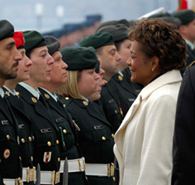 "Our Government is transforming Canada’s engagement in Afghanistan to focus on reconstruction and development, and to prepare for the end of our military mission there in 2011. The hard work and heroic sacrifices of Canada’s men and women in the field—military, diplomatic and development—will leave the people of Afghanistan the lasting legacy of a more secure, more peaceful and better governed country." "Our Government is transforming Canada’s engagement in Afghanistan to focus on reconstruction and development, and to prepare for the end of our military mission there in 2011. The hard work and heroic sacrifices of Canada’s men and women in the field—military, diplomatic and development—will leave the people of Afghanistan the lasting legacy of a more secure, more peaceful and better governed country."
And: "A new, non-partisan democracy promotion agency will also be established to support the peaceful transition to democracy in repressive countries and help emerging democracies build strong institutions." (Say no more, of course!)
11. Building Stronger Institutions
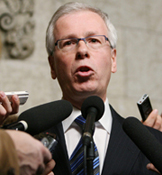 "Our Government will introduce legislation to move toward representation by population in the House of Commons for Ontario, British Columbia and Alberta. Legislation will also be introduced to allow for nominees to the Senate to be selected by voters, to serve fixed terms of not longer than eight years, and for the Senate to be covered by the same ethics regime as the House of Commons." "Our Government will introduce legislation to move toward representation by population in the House of Commons for Ontario, British Columbia and Alberta. Legislation will also be introduced to allow for nominees to the Senate to be selected by voters, to serve fixed terms of not longer than eight years, and for the Senate to be covered by the same ethics regime as the House of Commons."
I.e., the Harper minority government is going to keep trying to get the same legislation on these subjects it couldn’t get through the 39th Parliament through the 40th Parliament.
We’d be more critical (and we’re assuming the plans for Ontario are the same essentially unfair proposals advanced last year, or whenever it was — which we certainly don’t support). But Mr. Harper’s Senate reform policies are one of the few items on his agenda that we actually do support, without reservation. (And note how this year’s Throne Speech in the Senate’s fabled "Red Chamber" also highlighted just how many vacancies there are in the place these days — while the minority prime minister waits for something to happen with his reform legislation, before making any fresh Senate appointments.)
Senate reform plans certainly don’t have a lot to do with our current economic crisis. But, even in the middle of the closest we have come to the great depression of the 1930s since the 1930s, man (and woman) does not live by bread alone. (Which is no doubt a good thing even economically too, since bread continues to get more and more expensive, as stock markets continue to go down, down, down.)
Some final odds and ends ...
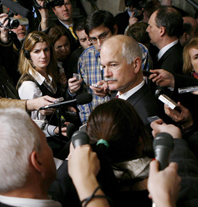 (1) A member of the Trudeau family was back in the Canadian House of Commons for the 143rd Speech from the Throne (the official title of which is "Protecting Canada’s Future"). If you get nostalgic about such things yourself, see the nostalgic video clip "A Trudeau in the House." (But if you actually hated Justin Trudeau’s father, of course don’t bother.) (1) A member of the Trudeau family was back in the Canadian House of Commons for the 143rd Speech from the Throne (the official title of which is "Protecting Canada’s Future"). If you get nostalgic about such things yourself, see the nostalgic video clip "A Trudeau in the House." (But if you actually hated Justin Trudeau’s father, of course don’t bother.)
(2) The 143rd Throne Speech has also warned Canadians to expect a deficit in the Government of Canada’s next budget [just in case you didn’t quite catch the subtle last point under 2. Ensuring Sound Budgeting above].
(3) For rather more serious economic news see: "Deflation now tops policy-makers' hit list"; and "More rate cuts coming ... The Canadian economy is deteriorating faster than previously thought and will require further stimulus, says Bank of Canada governor Mark Carney.".
(4) The eminent historian Christopher Moore does a nice job of explaining why we shouldn’t expect the re-election of Peter Milliken as Speaker, or anyone else’s blithe moralizing, "to improve decorum in the House" during the life of the 40th Parliament of Canada. See his "Peter Milliken, Speaker of the House" on the Christopher Moore’s Canadian History website. Only registered users can write comments.
Please login or register. Powered by AkoComment 1.0 beta 2!
|
